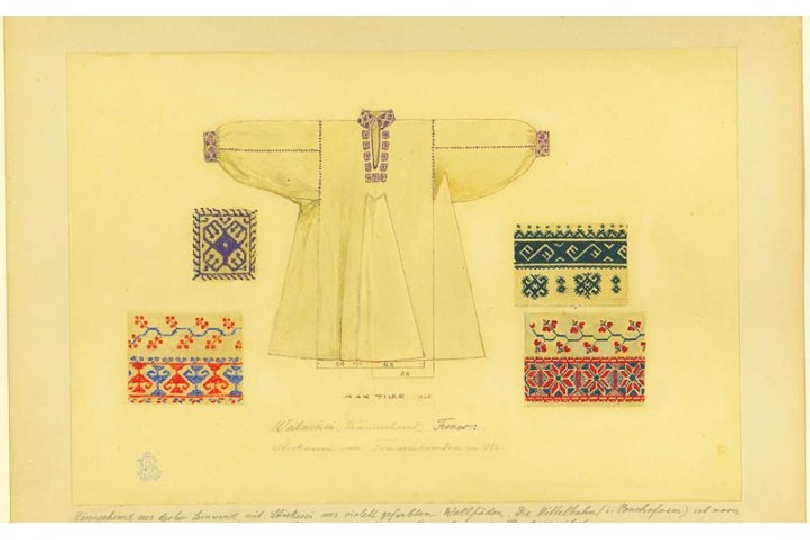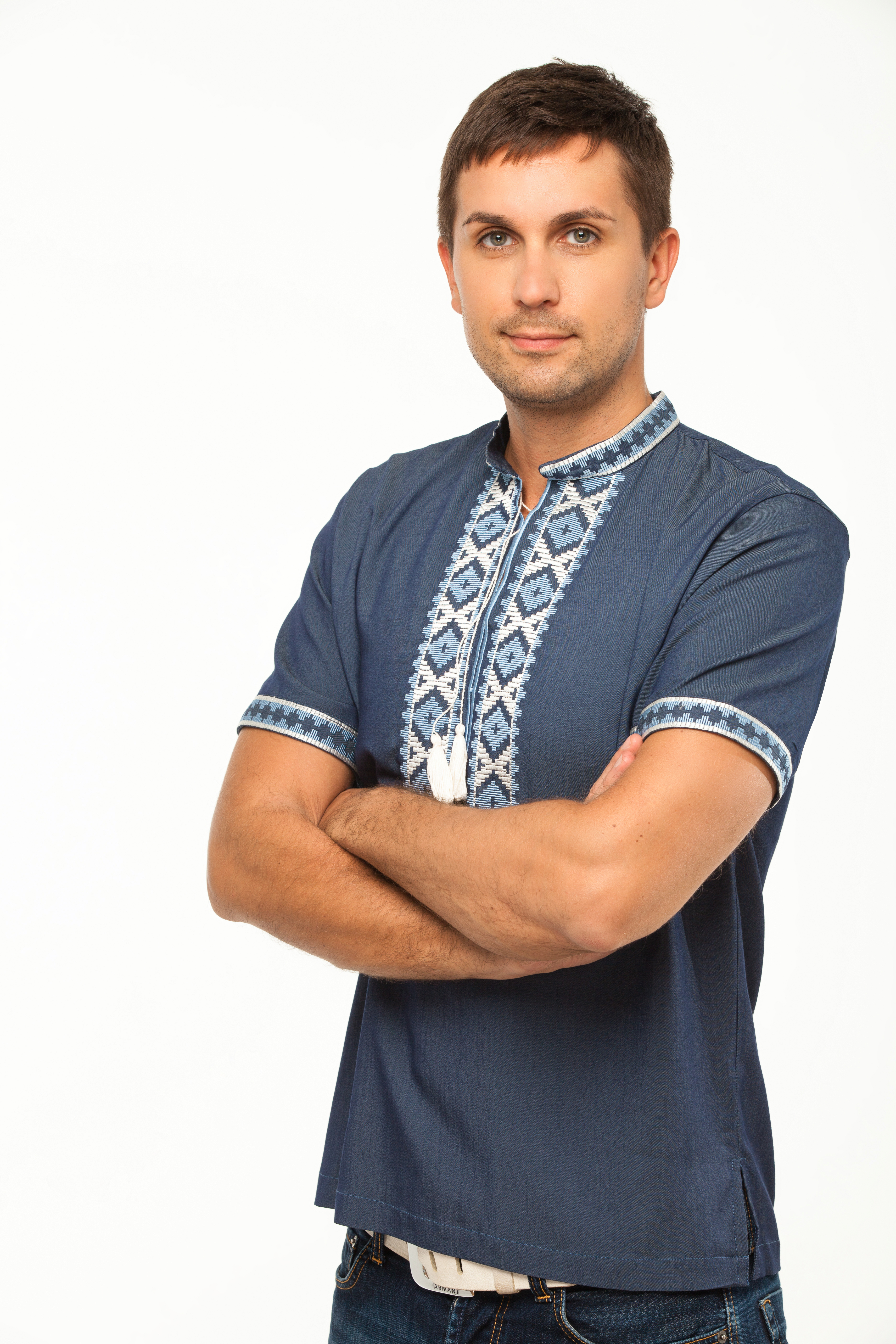Vyshyvanka is the nation’s code

According to historians and ethnographers, vyshyvanka (traditional Ukrainian embroidered shirt) is an element of the national clothing, a symbol of Ukrainian culture. Nevertheless, what does it mean to Ukrainians? By wearing vyshyvankas, some of them show their love and respect to their native land, others regard them as personification of the beauty of our Ukraine. Recently, when people from various, even the remotest countries started using the word “Ukraine”, vyshyvanka became an identifier of the Ukrainian nation in the world community.
If one wants to learn more about the origin of the embroidered Ukrainian shirt, there are many proofs that it represents a peace-loving and hard-working nature of Ukrainians, their spirituality, devotion to family and traditions.
So what is there in our national memory concerning this man-made symbol?
A shirt, as well as a human life, is closely connected with all natural elements. The first step of shirt creation lied in tillage and cultivation of flax, as flax originates in the Land. Then it is retted in Water, dried in the open Air and bleached using the ash left after the Fire. Spinning and weaving was another step in the creation of national clothing. Flax gave birth to something really perfect – a thread. After stranding and twisting, while spinning a chaotically tangled truss of mychka (a truss of flax fibers) turns into a perfectly flat and solid thread. By interweaving with each other on the loom, threads form the fabric – basis for future men’s or women’s shirt.
The Origin of the Shirt
Once a tailor took a measured cloth, doubled it and made a round hole for head – vykit. It became a symbol of the Sun letting a person’s head out into the world. The cuts for the sleeves are also called vykits. The slip-on cloth with pleats going down, like tender rays of the Great Sun, covered people, providing them with protection and warmth.
This is an authentic Ukrainian clothing – solemn, rich, voluminous, going down from the neck, emphasizing a generous multibeam circle-vykit – a symbol of the Sun. When the clothing was unrolled, it resembled a cross with a vykit in the middle.
In the beginning was the Ludyna
The word “ludyna” means a shirt. It is believed that it comes from the word “lub” (phloem) or “ludyty” (tin, decorate). The lyduna (a whole-cut cross-shaped clothing) as fine and bright as the sun was used to dress just christened children. Thus, this work of art unique in all respects became an important element of the Ukrainian sacred tradition.
According to the authors of the book entitled “Український стрій” (“Ukrainian clothing”) by M.S. Bilan and H.H. Stelmashchuk, by merging with the body and covering it, the ludyna became the basis for the creation of a new word in the Ukrainian language – lyudyna (a human being)! The shirt is a personal thing that accompanies people during all moments of their life, knows their thoughts and feelings, as well as absorbs their sweat and blood.
Sacred meaning of decorative patterns adorning men’s and women’s shirt
The shirt served as a carrier of the information about the person and the community in which he or she was born and lived. The symbols created with the help of a needle and thread (embroidery) also had to transfer that information.
Both women’s and men’s shirts were adorned with different symbols – at first, there were rhombs, circles, dots, and kryvulkas (Ukrainian embroidery symbol). Eventually, the symbols changed. The beauty and attractiveness of women’s shirt were emphasized by using floral patterns, while men’s shirt was adorned with arms and other family symbols stressing their courage, strength and supremacy.
Each region had its own symbols and decorative patters, that is why the shirt became a sign of ancestral and tribal belonging of the person. It identified the person’s place in the world and performed an important communicative function. Also, it was regarded as a counterpart of its owner, because, as a rule, it was created for a particular person and was the closest thing to his or her body. The shirt could inform about its owner’s age, gender, marital status, occupation and position in the community. It combined material and spiritual elements, and expressed the national character.
By wearing vyshyvanka, please think about a centuries-old history of the shirt’s origin, feel its mighty power. And don’t forget that each embroidered men’s and women’s shirt has got the wisdom of generations and can become a real talisman for its owner!
According to historians and ethnographers, vyshyvanka (traditional Ukrainian embroidered shirt) is an element of the national clothing, a symbol of Ukrainian culture. Nevertheless, what does it mean to Ukrainians? By wearing vyshyvankas, some of them show their love and respect to their native land, others regard them as personification of the beauty of our Ukraine. Recently, when people from various, even the remotest countries started using the word “Ukraine”, vyshyvanka became an identifier of the Ukrainian nation in the world community.
If one wants to learn more about the origin of the embroidered Ukrainian shirt, there are many proofs that it represents a peace-loving and hard-working nature of Ukrainians, their spirituality, devotion to family and traditions.
So what is there in our national memory concerning this man-made symbol?
A shirt, as well as a human life, is closely connected with all natural elements. The first step of shirt creation lied in tillage and cultivation of flax, as flax originates in the Land. Then it is retted in Water, dried in the open Air and bleached using the ash left after the Fire. Spinning and weaving was another step in the creation of national clothing. Flax gave birth to something really perfect – a thread. After stranding and twisting, while spinning a chaotically tangled truss of mychka (a truss of flax fibers) turns into a perfectly flat and solid thread. By interweaving with each other on the loom, threads form the fabric – basis for future men’s or women’s shirt.
The Origin of the Shirt
Once a tailor took a measured cloth, doubled it and made a round hole for head – vykit. It became a symbol of the Sun letting a person’s head out into the world. The cuts for the sleeves are also called vykits. The slip-on cloth with pleats going down, like tender rays of the Great Sun, covered people, providing them with protection and warmth.
This is an authentic Ukrainian clothing – solemn, rich, voluminous, going down from the neck, emphasizing a generous multibeam circle-vykit – a symbol of the Sun. When the clothing was unrolled, it resembled a cross with a vykit in the middle.
In the beginning was the Ludyna
The word “ludyna” means a shirt. It is believed that it comes from the word “lub” (phloem) or “ludyty” (tin, decorate). The lyduna (a whole-cut cross-shaped clothing) as fine and bright as the sun was used to dress just christened children. Thus, this work of art unique in all respects became an important element of the Ukrainian sacred tradition.
According to the authors of the book entitled “Український стрій” (“Ukrainian clothing”) by M.S. Bilan and H.H. Stelmashchuk, by merging with the body and covering it, the ludyna became the basis for the creation of a new word in the Ukrainian language – lyudyna (a human being)! The shirt is a personal thing that accompanies people during all moments of their life, knows their thoughts and feelings, as well as absorbs their sweat and blood.
Sacred meaning of decorative patterns adorning men’s and women’s shirt
The shirt served as a carrier of the information about the person and the community in which he or she was born and lived. The symbols created with the help of a needle and thread (embroidery) also had to transfer that information.
Both women’s and men’s shirts were adorned with different symbols – at first, there were rhombs, circles, dots, and kryvulkas (Ukrainian embroidery symbol). Eventually, the symbols changed. The beauty and attractiveness of women’s shirt were emphasized by using floral patterns, while men’s shirt was adorned with arms and other family symbols stressing their courage, strength and supremacy.
Each region had its own symbols and decorative patters, that is why the shirt became a sign of ancestral and tribal belonging of the person. It identified the person’s place in the world and performed an important communicative function. Also, it was regarded as a counterpart of its owner, because, as a rule, it was created for a particular person and was the closest thing to his or her body. The shirt could inform about its owner’s age, gender, marital status, occupation and position in the community. It combined material and spiritual elements, and expressed the national character.
By wearing vyshyvanka, please think about a centuries-old history of the shirt’s origin, feel its mighty power. And don’t forget that each embroidered men’s and women’s shirt has got the wisdom of generations and can become a real talisman for its owner!





Comments
No comment at this time!
Leave your comment